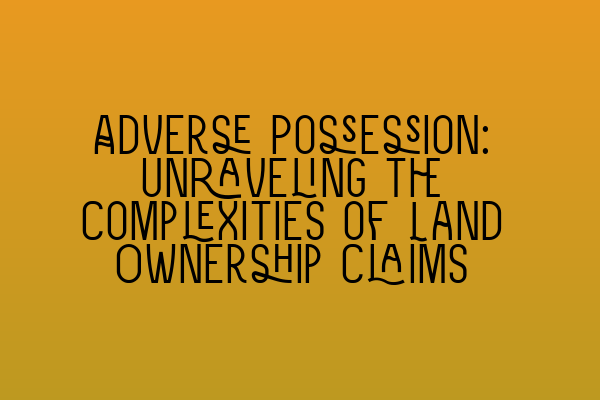Adverse Possession: Unraveling the Complexities of Land Ownership Claims
Introduction
Land ownership claims can be complex and contentious matters. One particular concept that often arises in these cases is adverse possession. Adverse possession refers to a situation where a person claims legal ownership of a property that they do not hold the title to. This legal doctrine has been the subject of much debate and confusion over the years. In this blog post, we will explore the intricacies of adverse possession and shed light on this fascinating aspect of property law.
Understanding Adverse Possession
Adverse possession occurs when a person possesses another individual’s property continuously and openly, without the permission of the lawful owner, for a specified period of time. This possession must be exclusive, meaning that the person claiming adverse possession must have exclusive control and use of the property. Furthermore, the possession must be adverse, which means it must be against the wishes and rights of the true owner.
The concept of adverse possession serves several purposes, including preventing “paper owners” who neglect their properties from retaining legal ownership. It also provides a mechanism for resolving disputes over long-term possession of land and encourages the efficient use of land.
Determining the Elements of Adverse Possession
To make a successful adverse possession claim, certain elements must be established. These elements vary in different jurisdictions, but generally include:
1. Actual Possession: The claimant must have actual physical possession of the property. This means they must physically occupy and use the land in question.
2. Open and Notorious: The possession must be open and notorious, meaning it is obvious and apparent to anyone who observes it. The claimant cannot hide their possession or use of the property.
3. Exclusive Possession: The possession must be exclusive, meaning the claimant has sole control and use of the property. Other individuals cannot have concurrent possession.
4. Hostile Possession: The possession must be hostile to the true owner’s rights. It does not necessarily mean there is animosity between the claimant and the true owner. Rather, hostile possession refers to possession without the true owner’s consent.
5. Continuous Possession: The possession must be continuous for a specified period of time, which varies depending on the jurisdiction. This period typically ranges from several years to a couple of decades.
Challenges and Defenses in Adverse Possession Claims
Adverse possession claims are not without their challenges. The true owner may dispute the claim and defend their title. Common defenses to adverse possession claims include:
1. Trespassing Notices: If the true owner issues written notices to the claimant, informing them of their trespassing and demanding they vacate the property, it may weaken the claimant’s adverse possession case.
2. Permission: If the claimant had permission from the true owner to possess the property, adverse possession cannot be established.
3. Disability: If the true owner is under a legal disability, such as being a minor or mentally incapacitated, their rights may be preserved, and adverse possession may not be applicable.
4. Registered Land: Adverse possession claims are generally more difficult to establish for registered land, as the government’s records are presumed to be accurate.
Navigating the Complexity of Adverse Possession
Given the complexities of adverse possession claims, it is crucial to seek legal advice from experienced property law solicitors, like those at SQE Property Law & Land Law. They can provide expert guidance in navigating the intricacies of adverse possession and ensure that your interests are adequately protected.
Conclusion
Adverse possession is a fascinating aspect of property law that holds significant implications for land ownership claims. Understanding the elements and challenges of adverse possession is crucial for both property owners and those seeking to assert adverse possession rights. If you find yourself involved in an adverse possession dispute, it is essential to consult with legal professionals who specialize in property law to help you navigate through the complexities of the process.
For more information on property law and preparing for the SQE exams, consider checking out these related articles:
– SQE 1 Practice Exam Questions
– SQE 1 Practice Mocks FLK1 FLK2
– SQE 2 Preparation Courses
– SQE 1 Preparation Courses
– SRA SQE Exam Dates
At SQE Property Law & Land Law, we are committed to providing comprehensive legal services and resources to assist you in your property-related matters. Contact us today to schedule a consultation and discover how we can help you with your adverse possession claim or any other property law concerns.
